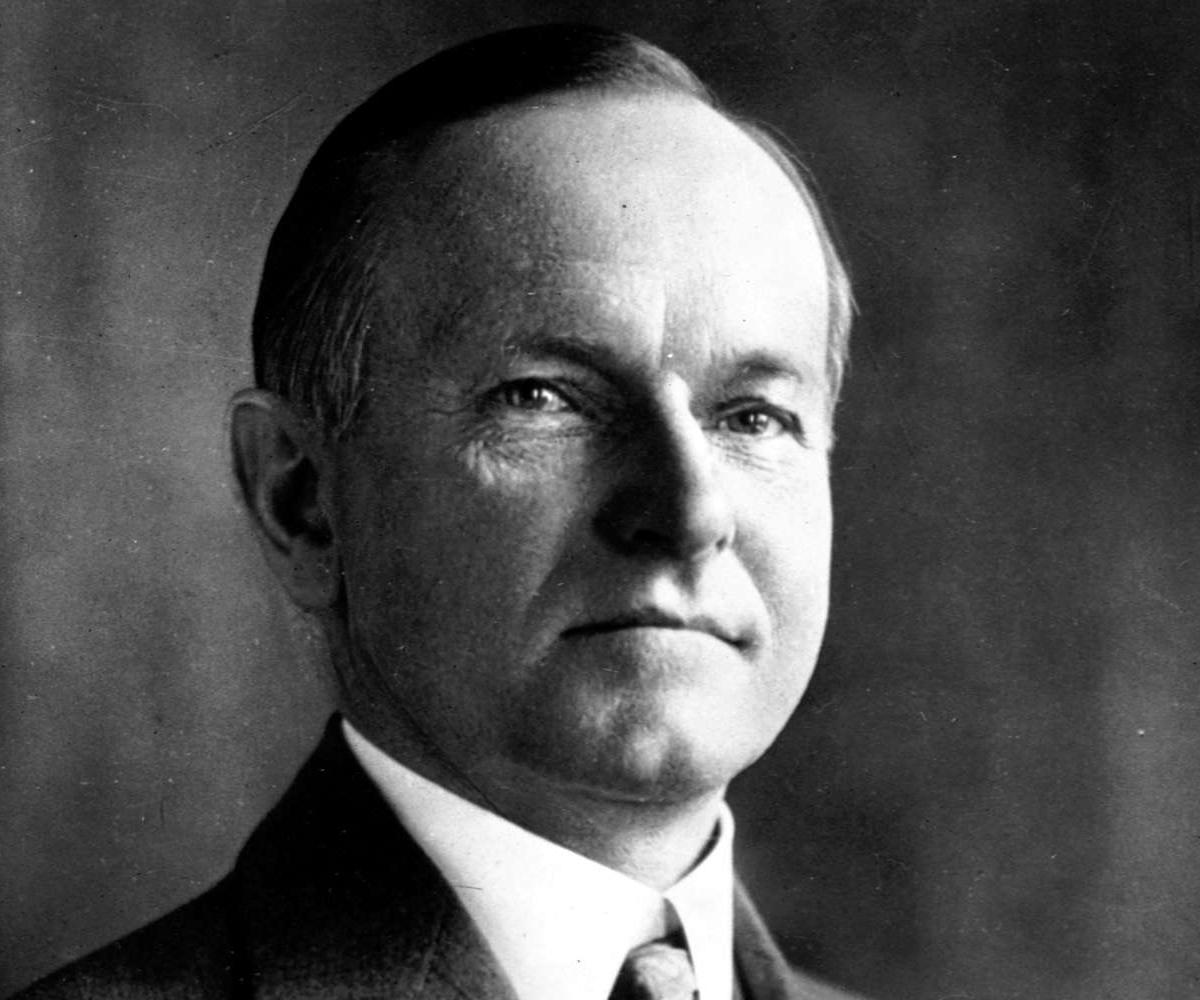
(Originally published July 1, 2004.)
Historians have trivialized Calvin Coolidge as a do-nothing President naive enough to believe that “the business of America is business,” and many have rated him as one of the worst of all time. However, he produced remarkable results without sacrificing our freedoms. And given that he was born on the 4th of July, there is no better time than our Independence Day to remember him. Under Coolidge, the top income tax rate of 65% under Wilson was eventually cut to 20%. The stock market began its unprecedented “roaring 20s” climb as it became clear through 1924 that Coolidge’s tax reduction bill would pass. In both his first and last year in office, federal receipts were $3.8 billion and expenditures were $3.1 billion, and in between, he cut the national debt from $22.3 billion to $16.9 billion.
His policies took more than a million people off the income tax rolls, and 98% of Americans paid no income tax at the end of his term. As a result, America prospered under Coolidge. Real economic growth averaged 7% per year while he was in office (the highest growth on record), while inflation averaged only 0.4%. Investment, manufacturing output, and disposable income rose dramatically, and unemployment averaged 3.3%. That remarkable record explains why, after Coolidge outpolled his Democratic opponent by nearly 2 to 1 in 1924, he would have won in another landslide if he had run again in 1928. But unfortunately for America, he did not.
So why is there such a disconnect between Coolidge’s success and his reputation? In large part, it is because he advocated individualism, as clearly spelled out in his speeches (which he composed himself), and the newspaper column he wrote after leaving the Presidency. But while that seems appropriate for someone born on the Fourth of July, it is so distant from the modern mindset that many now cannot understand why someone who, as state Senator, Governor, Vice-President, and President viewed government intervention in broad areas of life as a problem rather than a panacea. Further, people have attributed to Coolidge the origins of the Great Depression under Herbert Hoover, his secretary of commerce. But they have not done so because of any evidence that his policies were responsible.
Along with monetary policy blunders, the Great Depression was triggered by Hoover’s abandonment of Coolidge’s policies, in favor of disasters ranging from erecting monumental trade barriers to sharply raising tax rates. Never was this divide between the policies of the two made clearer than when Coolidge said of Hoover: “That man has offered me unsolicited advice for six years, all of it bad.” Calvin Coolidge may have been called “Silent Cal,” but his record brags for him, if people would bother to look honestly. Further, he closely reflected our founders’ insight in what he wrote and said, which we would truly profit from, given how far we have deviated from those ideas in modern America.
On Liberty and Rights
There is no greater service we can render the oppressed of the earth than to maintain inviolate the freedom of our own citizens.
Liberty is not collective, it is personal. All liberty is individual liberty.
There is no substitute for a militant freedom. The only alternative is submission and slavery.
Freedom is not only bought with a great price; it is maintained by unremitting effort.
There is no justification for public interference with purely private concerns.
The individual has rights…And the protection of rights is righteous.
Ultimately, property rights and personal rights are the same thing.
When once the right of the individual to liberty and equality is admitted, there is no escape from the conclusion that he alone is entitled to the rewards of his own industry. Any other conclusion would necessarily imply either privilege or servitude.
The property of the people belongs to the people. To take it from them by taxation cannot be justified except by urgent public necessity. Unless this principle be recognized, our country is no longer secure, our people no longer free.
A government which requires of the people the contribution of the bulk of their substance and rewards cannot be classed as a free government…
I want the people of America to be able to work less for the Government and more for themselves. I want them to have the rewards of their own industry. That is the chief meaning of freedom. Until we can re-establish a condition under which the earnings of the people can be kept by the people, we are bound to suffer a very distinct curtailment of our liberty.
If ever the citizen comes to feel that our government does not protect him in the free and equal assertion of his rights… he will withdraw his allegiance from that government…
In its main features the Declaration of Independence…is a declaration not of material but of spiritual conceptions. Equality, liberty, popular sovereignty, the rights of man…are ideals.
Our doctrine of equality and liberty and humanity comes from our belief in the brotherhood of man…
On the Constitution—Defender of American Liberty
To live under the American Constitution is the greatest political privilege that was ever accorded to the human race.
The Constitution is the sole source and guaranty of national freedom.
Men do not make laws. They do but discover them. Laws must be justified by something more than the will of the majority. They must rest on the eternal foundation of righteousness.
There is scarcely a word in the constitution of any of our States or of our nation that was not written there for the purpose of protecting the liberties of the people from some servitude which a despotic government had at some time imposed upon them.
[But] the matchless wisdom that is enshrined in our Constitution…needs constant effort and tireless vigilance for their protection and support.
We need not concern ourselves much about the rights of property if we will faithfully observe the rights of persons. Under our institutions their rights are supreme. It is not property but the right to hold property, both great and small, which our Constitution guarantees.
Unfortunately the Federal Government has strayed far afield from its legitimate business. It has trespassed upon fields where there should be no trespass. If we could confine our Federal expenditures to the legitimate obligations and functions of the Federal Government, a material reduction would be apparent. But far more important than this would be its effect upon the fabric of our constitutional form of government, which tends to be gradually weakened and undermined by this encroachment.
On Commerce—Outgrowth of Liberty
Where commerce has flourished there civilization has increased. Today it is not the battle fleet, but the mercantile fleet which in the end will determine the destiny of nations.
Civilization and profits go hand in hand.
After all, the chief business of the American people is business… In all experience, the accumulation of wealth means the multiplication of schools, the encouragement of science, the increase of knowledge, the dissemination of intelligence, the broadening of outlook, the expansion of liberties, the widening of culture. Of course the accumulation of wealth cannot be justified as the chief end of existence. But we are compelled to recognize it as a means to well-nigh every desirable achievement. So long as wealth is made the means and not the end, we need not greatly fear it.
We cannot improve the condition of the people or reform human nature by intruding the Nation into the affairs of the States or despoiling the people of their business.
I would like it if the country could think as little as possible about the Government and give their time and attention more undividedly about the conduct of the private business of the country.
Our country is an exceedingly good example of the fact that if production be encouraged and increased, then distribution fairly well takes care of itself… no other country ever approached ours in the equal and general distribution of prosperity.
We have had many attempts at regulation of industrial activity by law. Some of it has proceeded on the theory that if those who enjoyed material prosperity used it for wrong purposes, such prosperity should be limited or abolished. That is as sound as it would be to abolish writing to prevent forgery.
An expanding prosperity requires that the largest possible amount of surplus income should be invested in productive enterprise under the direction of the best personal ability. This will not be done if the rewards of such action are largely taken away by taxation.
That tax is theoretically best which interferes least with business.
The wise and correct course to follow in taxation and all other economic legislation is not to destroy those who have already secured success but to create conditions under which every one will have a better chance to be successful.
No matter what any one may say about making the rich and the corporations pay the taxes, in the end they come out of the people who toil. It is your fellow workers who are ordered to work for the Government every time an appropriation bill is passed.
No complicated scheme of relief, no plan for Government fixing of prices, no resort to the public Treasury will be of any permanent value…
Government price fixing, once started, has alike no justice and no end. It is an economic folly from which this country has every right to be spared.
On A Government Consistent With Liberty
…what the people cannot do their government cannot do.
After order and liberty, economy is one of the highest essentials of a free government.
I favor the policy of economy, not because I wish to save money, but because I wish to save people. The men and women of this country who toil are the ones who bear the cost of the Government. Every dollar that we carelessly waste means that their life will be so much the more meager. Every dollar that we prudently save means that their life will be so much the more abundant. Economy is idealism in its most practical form.
The success of the Government does not lie in wringing all the revenue it can from the people, but in making their burden as light and fairly distributed as possible, consistent with the proper maintenance of the necessary public functions.
Perhaps one of the most important accomplishments of my administration has been minding my own business.
The people cannot look to legislation generally for success.
There can be no perfect control of personal conduct by national legislation.
[I will not] surrender to every emotional movement seeking remedies for economic conditions by legislation.
You can display no greater wisdom than by resisting proposals for needless legislation. It is much more important to kill bad bills than to pass good ones.
We have got so many regulatory laws already that in general I feel that we would be just as well off if we didn’t have any more.
We do not need more law…
If all the folks in the United States would do the few simple things they ought to do, most of our big problems would take care of themselves.
We cannot improve the condition of the people or reform human nature by…despoiling the people of their business.
When depression in business comes we begin to be very conservative in our financial affairs. We save our money and take no chances in its investment. Yet in our political actions we go in the opposite direction. We begin to support radical measures and cast our votes for those who advance the most reckless proposals. This is a curious and illogical reaction.
The appropriation of public money always is perfectly lovely until some one is asked to pay the bill…the people will have to furnish more revenue by paying more taxes.
I can lay down the broad principle that I am not in favor of imposing any new kinds of taxes.
Whenever the state of the Treasury can permit, I believe in a reduction of taxes. But I am not advocating tax reduction merely for the benefit of the taxpayer; I am advocating it for the benefit of the country.
When one looks at Calvin Coolidge’s record and his words, particularly his close adherence to the long-since eroded principles on which America was based, it is easy to see why, despite all the historical mud-slinging that he has been the victim of, he would likely have been our founding fathers’ favorite 20th century President. It is time we looked under the blanket of obscurity and calumny that has been thrown over his record and his ideas, so that we can rediscover that wisdom.



